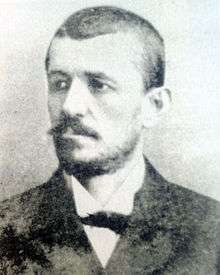Shahin Kolonja
| Shahin Teki Kolonja | |
|---|---|
 | |
| Born |
Shahin Teki Ypi 1865 Starje, Ottoman Empire |
| Died |
1919 Istambul, Ottoman Empire |
| Other names |
Şahin Teki Kolonya Shahin Bey Kolonja |
| Occupation | Politician, civil servant, publisher |
| Known for |
Drita magazine Congress of Monastir |
Shahin Kolonja (1865-1919), also known as Şahin Teki Kolonya, was an Albanian journalist and politician.
Life
Shahin Kolonja was born in Starje, Ottoman Empire, today's southern Albania, as Shahin Teki Ypi.[1]
Kolonja was a graduate of the school of civil service and had served as director of several idadiye schools, initially in Edirne.[2] He was one of the few Albanians employed in the Ottoman public administration who abandoned the service in order to follow their dreams and beliefs. Later he was arrested in Bitola and sentenced to three years in prison for disseminating Albanian-language works. In 1897 he wrote a memorandum to the Ottoman authorities for a permission to publish a newspaper in Albanian. The request was rejected. Two years later he asked help from the Austro-Hungarian counsel in Monastir for help in publishing the newspaper. Due to difficulties and continuous surveillance from the authorities, he had to leaeve the country. Kolonja went to various countries in Europe, finally settling in Sofia.
From 1901 to 1908 he published in Sofia the journal Drita, task which was initially handled by Petro Poga, with the help of Kristo Luarasi (1876-1934) and financial support of Austro-Hungary.[3]
Luarasi was serving as the manager of the printing press "Mbrothësia" ("Progress"). The printing press was previously established by the Albanian colony of Sofia, grouped mainly under the "Dëshira" ("Desire") Society, with the aim of spreading knowledge and Albanian language instructions between Albanians, and serving the national cause.[4]
Through the newspaper, Kolonja and Luarasi would intensively work for sharpening the national conscience of the Albanian, and providing books in Albanian language.
While in Sofia, Kolonja would support Mustafa Ragib, a pro Young Turk revolutionary of Bulgaria. With Kolonja's help, Ragib restarted publishing his newspaper Efkar-ı Umumiye ("Public Opinion") in Bulgarian and Turkish. "Public Opinion" consequently dedicated many of its pages to Albanian affairs as well, and publicized Albanian nationalistic materials. Even this would not go unnoticed from Ottoman authorities which would recall Ragib to disconnect him from Kolonja's influence.[5]
In 1904, Kolonja translated into Ottoman Turkish and published in Drita the manifesto of Albanian National Awakening, Sami Frashëri's "Shqipëria ç'ka qenë, ç'është e çdo të bëhetë" ("Albania - what it was, what it is and what it will be") of 1889.[6]
In 1908, Kolonja was elected deputy of Korçë in the Ottoman parliament with the financial support of Albanian activists. He was a prominent member of the 26 assemblymen that represented the four Albanian Vilayets.[7] At the same year he became one of the delegates of Congress of Monastir, in which the Albanian alphabet was standardized.
In 1908 he joined the Ahrar' Party founded by Ismail Qemali, and in 1910 the Democrat Party founded by Ibrahim Temo and Abdullah Cevdet. Due to hostilities with the Young Turks he had to go abroad again in 1911. After spending a couple of months in Vlora in 1913, he moved back to Istambul in 1915 with this family. Kolonja was married to Naim Frashëri's daughter.[3]
From this time until his death in 1919 he did not participate any political activities, due to health problems and alcohol dependency.
See also
Sources
- ↑ Piro Tako (1984), Shahin Kolonja (Ypi): jeta dhe veprimtaria atdhetare e publicistike, Tirana: 8 Nëntori, OCLC 66803008
- ↑ Somel, Selçuk Akşin (2001). The modernization of public education in the Ottoman Empire, 1839-1908: Islamization, autocracy, and discipline. BRILL. p. 128. ISBN 978-90-04-11903-1. Retrieved 26 June 2011.
- 1 2 Elisabeth Özdalga (March 16, 2011). Late Ottoman Society: The Intellectual Legacy (I ed.). Routledge. pp. 294, 315–317. ISBN 978-0415665445.
- ↑ Edwin Jacques (January 16, 2009). The Albanians: An Ethnic History from Prehistoric Times to the Present. II. McFarland. pp. 298–299. ISBN 978-0786442386.
- ↑ M. Sukru Hanioglu (March 1, 2001). Preparation for a Revolution: The Young Turks, 1902-1908. Studies in Middle Eastern History. Oxford University Press. p. 75. ISBN 978-0195134636.
- ↑ Balázs Trencsényi, Michal Kopeček (January 25, 2007). National Romanticism: The Formation of National Movements. Discourses of Collective Identity in Central and Southeast Europe. Central European Univ Pr. p. 301. ISBN 978-9637326608.
- ↑ Pearson, Owen (2004). Albania in the twentieth century: a history. I.B.Tauris. p. 2. ISBN 978-1-84511-013-0. Retrieved 26 June 2011.